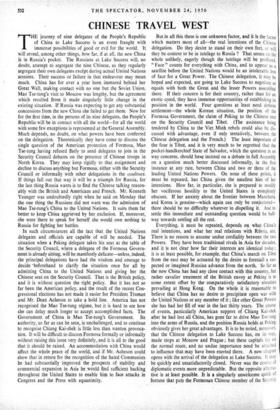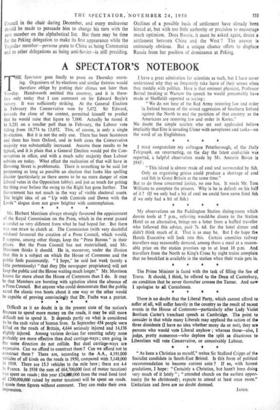CHINESE TRAVEL WEST.
TTHE journey of nine delegates of the People's Republic of China to Lake Success is an event fraught with immense possibilities of good or evil for the world. It will reveal, among other things, bow far, if at all, the new China Is in Russia's pocket. The Russians at Lake Success will, no doubt, attempt to segregate the nine Chinese, as they regularly segregate their own delegates except during actual United Nations sessions. Their success or failure in that endeavour may -mean much. China has for over a year been immured behind her Great Wall, making contact with no one but the Soviet Union. Mao Tse-tung's visit to Moscow was lengthy, but the agreement which resulted from it made singularly little change in the existing situation. If Russia was expecting to get any substantial concessions from the new China she failed to get them. Now for for the first time, in the persons of its nine delegates, the People's , Republio will be in contact with all the world—for all the world with some few exceptions is represented at the 'General Assembly. Much depends, no doubt, on what powers have been conferred on the delegation. Theoretically they have come to discuss the single question of the American protection of Formosa, Mao Tse-tung having refused flatly, to send delegates to join in the Security Council debates on the presence of Chinese troops in North Korea. They may keep rigidly to that assignment and decline to discuss anything but Formosa; either with the Security Council or informally with other delegations in the coulisses. If things fall out that way it will be a triumph for Russia, for the last thing Russia wants is to find the Chinese talking reason- ably with the British and Americans and French. Mr. Kenneth Younger was undoubtedly right when he said on Monday that the one thing the Russians did not want was the admission of Mao Tse-tung's China to the United Nations. It suits them far better to keep China aggrieved by her exclusion. If, moreover, she were there to speak for herself she would owe nothing 6 Russia for fighting her battles.
In such circumstances all the tact that the United Nations delegates and officials are capable of will be needed. The situation when a Peking delegate takes his seat at the table of the Security Council, where a delegate of the Formosa Govern- ment is already sitting, will be manifestly delicate—unless, indeed, the principal delegations have had the wisdom and courage to decide 'beforehand to clarify the situation once for all by admitting China to the United Nations and giving her the Chinese seat on the Security Council. That is the British policy, and it is without question the right policy. But it has not so far been the American policy, and the result of the recent Con- gressional elections has not made it easier for President Tillman and Mr. Dean Acheson to take a bold line. America has not recognised the Mao Tse-tung regime, but it is hard to see how she can delay much longer to accept accomplished facts. The Government of China is Mao Tse-tung's Gbvernment. Its authority, so far as can be seen, is unchallenged, and to continue to recognise Chiang Kai-shek is little less than wanton provoca- tion. It will be difficult to discuss Formosa formally or informally without raising this issue very definitely, and it is all to the good that it should be raised. An accommodation with China would affect the whole peace of the world, and if Mr. Aoheson could show that in return for the recognition of the bated Communists he had substantially improved the prospects of stability and commercial expansion in Asia he would find sufficient backing throughout the United States to enable him to face attacks in Congress and the Press with equanimity. But in all this there is one unknown factor, and it is the factor which matters most of all—the real Intentions of the Chinese delegation. Do they desire to stand on their own feet, or will they be content to be in tutelage to Russia ? That seems on the whole unlikely, eagerly the-ugh the tutelage will be proffered. "Face r counts for everything with China, and to appear as a satellite before the United Nations would be an intolerable loss of face for a Great Power. The Chinese delegation, it may be hoped and expected, are going to Lake Success to negotiate as equals with both the Great and the lesser Powers assembled there. If their concern is for their country, rather than for an exotic creed, they have immense opportunities of establishing its position in the world. Four questions at least need definite settlement—the whole Korean situation, the position of the Formosa Government, the claim of Peking to the Chinese seat on the Security Council and Tibet (The assistance being tendered by China to the Viet Minh rebels could also be dis- cussed with advantage, even if only tentatively, between the Chinese delegation and the French.) The least important of the four is Tibet. and it is very much to be regretted that the pocket-handkerchief State of Salvador, which the question in no way concerns, should have insisted on a debate in full Assembly on a question much better discussed informally, in the first instance at any rate, between China and two or three of the leading United Nations Powers. On none of these points, it must be repeated, has China given the smallest hint of her intentions. How far, in particular, she is prepared to modify her vociferous hostility to the United States is completely obscure. If her anxiety about the frontier between Manchuria and Korea is genuine—which again can only be conjectured— there should be no difficulty whatever in dispelling it. And to settle this immediate and outstanding question would be half- way towards settling all the rest.
Everything, it must be repeated, depends on what China's real intentions, and what her real relations with Rtssia, are. There is no reason to assume undue cordiality between the two Powers. They have been traditional rivals in Asia for decades, and it is not clear how far their interests are identical today ; it is at least possible, for example, that China's march on Tibet from the east may be actuated by the desire to forestall a sus- pected or imagined Russian advance from the north. So far as the new China has had any close contact with this country, her rather cavalier treatment of the British envoy at Peking is to some extent offset by the comparativelysatisfactory situation prevailing at Hong Kong. On the whole it is reasonable to believe that dhina has no desire- to precipitate open war with the United Nations or any member of it ; like other Great Powers she has had her fill of war in the last thirty- years. The course of events, particularly American support of Chiang Kai-shek after he had Inst all China, has gone far to .drive Mio Tse-tung into the arms of Russia, and the position Russia holds at Peking obviously gives her great advantages. It is to be noted, moreover, that the Chinese delegation to Lake Success has, on its way, made stops at Moscow and Prague,; but these capitals lay on the normal route, and no undue importance need -be attached to influence that may have been exerted there. A new chapter opens with the arrival of the delegation at Lake Success. It may be quickly and unsatisfactorily closed. Never was the course of diplomatic events more unpredictable. But the opposite alterna- tive is at least possible. It is a singularly unwelcome quirk of fortune that puts the Formosan Chinese member of the Security Council in the chair during December, and every endeavour should be made to persuade him to change his turn with the next member on the alphabetical list. But there may be time for the Peking delegation to make its first appearance while the Yugoslav member—persona grata to China as being Communist and to other delegations as being anti-Soviet—is still presiding. Outlines of a possible basis of settlement have already been hinted at, but with too little authority or precision to encourage much optimism. Does Russia, it must be asked again, desire a settlement between China and the West ? The answer is ominously obvious. But a unique chance offers to displace Russia from her position of dominance at Peking.















































































 Previous page
Previous page